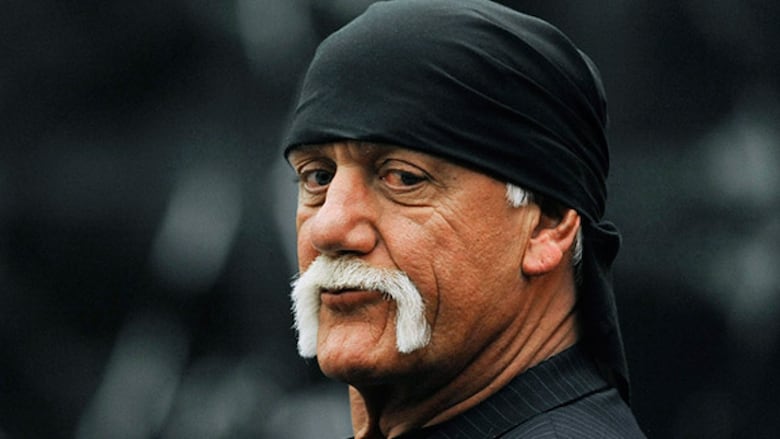Hulk Hogan was a heel — both in the ring, and in real life
Wrestling fans Pablo the Don and Damian Abraham talk about how the late wrestler turned the crowd against him

Last week, Hulk Hogan, one of the most famous American professional wrestlers and a cultural icon of the '80s and '90s, died at the age of 71.
He's being remembered for the way he raised the profile of the sport, and his unforgettable crossover into mainstream culture at large. But he also left behind a history of hateful behaviour too vast to ignore.
Today on Commotion, wrestling fans Pablo the Don and Damian Abraham join host Elamin Abdelmahmoud to unpack Hogan's complicated legacy.
We've included some highlights below, edited for length and clarity. For the full discussion, listen and follow Commotion with Elamin Abdelmahmoud on your favourite podcast player.
Elamin: There's an inherent limitation to this all-American-ness idea that he tried to sell. It's a good door-opener; it helps the WWF at the time (WWE now) become this mainstream, gigantic thing. Because if you've never been engaged with that project, maybe Hulk Hogan becomes an invitation to it. But then once you're in, you're like, "Whoa, these characters are much deeper, much richer than Hulk Hogan is."
You referenced him going heel. I think that's an important period of time to talk about because Hulk Hogan goes from the all-American boy who was the face of WWF at the time, and then as the WWF is sort of cresting its incredibly high '90s era, Hulk Hogan jumps ship to the WCW. And there, he goes from playing the good guy to he turns heel — a.k.a. the crowd is now mad at you. The crowd is against you. And he actually, to me, does OK in that mode, which is not a mode that I would have thought he would succeed in. But maybe it's worth talking about this, Pablo. What was this period of Hulk Hogan's career like to witness?
Pablo: I feel like that was probably him in his truest form. He's a heel in real life, and now he gets to play one on television. Like, it's tried and true. That's very much Hulk Hogan. I think at the time, we have to realize that as a country in America, we were so different. He turns heel after Nirvana. He turns heel once, like, Cops is one of the biggest shows. Trash daytime TV is a thing. So they started infusing a lot of reality elements into wrestling. And at this time, this is right after the big steroid trial, which Hulk Hogan was supposed to be the star witness of. He notoriously says that he's taken steroids, but doesn't give any blame to Vince McMahon, which at that time pretty much gets Vince McMahon off. But also at that same time, it kind of shatters this fourth wall of wrestling, where people find out his real name is not Hulk Hogan. It's actually Terry Bollea. And him and Vince were actually friends behind the scenes. And Vince isn't just the commentator; he owns WWF. It really broke down that fourth wall.
And so when Hogan goes heel, he's embracing who he truly is in real life. But at the same time, it brings wrestling to another level. You see him go heel, and then you have the rise of Stone Cold Steve Austin, who is exactly who he says he is, in '96, '97, '98. You have the rise of The Rock, who notoriously says The Rock is Dwayne Johnson dialed up to 10. You have these people infusing who they actually are into the character, which makes this thing just explode even more and have another big boom period.
Damian: I think it's important to mention that he kind of looked at what was happening with two other guys that had jumped ship more recently than him from WWF at the time, which was Diesel (Kevin Nash) and Razor Ramon (Scott Hall). Both these guys showed up in WCW, started using their real names and, like Pablo said, embodied a reality and embodied a cool. I think Hulk Hogan … kind of looked at that and was able to at least ride that wave, borrow that. And it was never as inherently cool as either of those guys.
Elamin: No. Never. I should say Diesel, Kevin Nash, great in the Magic Mike movies, but that's neither here nor there.
You can listen to the full discussion from today's show on CBC Listen or on our podcast, Commotion with Elamin Abdelmahmoud, available wherever you get your podcasts.
Panel produced by Amelia Eqbal.